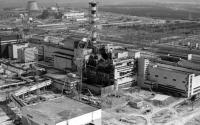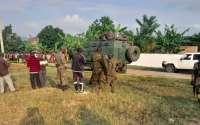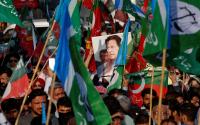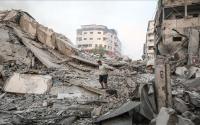by Satya Sagar October 19, 2003
Picture this scenario. Hardcore terrorist lands in a large Asian metropolis. His mission: to attack a summit of world leaders about to happen in town.
However his taxi driver charms him into buying fake jewelry, having a massage and drinking all night long in a karaoke bar instead. Terrorist goes back to the cave he came from red-faced, with a terrible hangover and head buzzing with excuses for `mission unaccomplished'. (Brother Bin, you should have been there -------!!!!)
A fantasy tale surely, but if there is any place in Asia where such an episode is plausible at all it is in the tourist friendly, freewheeling Thai capital Bangkok. The Thaksin Shinawatra government hosting the upcoming Asia-Pacific Economic Cooperation (APEC) meet this month however is leaving nothing to the natural charms of Thai taxi drivers.
Instead it has ordered schools, banks closed for the two days of the APEC meet and government institutions closed for almost an entire week. Citizens have been mobilized to identify and report terrorist activity while the police has thrown a security blanket around important installations and the city's international airport
And in this siege-like situation on October 20-21, heads of state of 21 APEC countries, including US President George Bush Jr., are expected to deliberate over all things 'free' in the world: free trade, free access to other people's resources and freeing the globe from terrorism.
The paranoia over keeping 'terrorists out' in a country known more for keeping 'tourists in' has reached comical proportions. So for example recently we had the spectacle of 5000 motorcycle taxi drivers in Bangkok being instructed by Thai police on the finer aspects of spotting and correctly identifying a shoulder fired surface-to-air missile launcher !
Police officials kept getting confused between 'tourists' and 'terrorists' through out the training session. After giving the taxi drivers a long lecture on watching out for missile launchers hidden inside golf bags they ended up advising them ' brush your teeth and wear clean clothes´ to welcome APEC participants.
But are terrorists the only two-legged creatures that global leaders are today supposed to be afraid of ? Apparently not. Thai authorities in recent days have carried out sweeping raids to arrest, evict or deport all homeless people, migrant workers, destitute street children selling flowers on the roads, stray dogs (sorry, there were some four-legged targets too !).
I forgot to mention those pesky foreign anti-globalization activists, hundreds of whom have been black-listed and denied visas to enter Thailand during the APEC summit. Local activists and NGOs have been told to stay home and not 'embarrass' the nation by organising protests on as important an occasion as Dubya coming to town.
Thai governments genuinely have a historical problem in keeping terrorists out of their soil.
During the Second World War when the Japanese Imperial Army, then terrorizing much of Asia, swept through Thailand the ruling military regime quickly organized a welcome party for the invaders. Under Field Marshal Pibul Songkram, an ardent admirer of fascism, Thailand became an official part of the Axis powers and a host to a very large number of Japanese terrorists.
The Field Marshal had to step down from power when the Japanese lost the war in 1945 but just five years later came back with a CIA-backed coup because like all former fascists he was useful in the fight against the 'communists'.
The sixties and seventies again saw the Thais welcoming huge contingents of terrorists- this time from the United States itself, using Thailand as a base to attack the communists in Indochina. The world knows well what horrendous damage the US terrorist attacks did to the people of Vietnam, Laos and Cambodia while Thailand merrily made pots of money out of the massacre. Showing how successive Thai governments have been extremely hospitable to terrorists who come with the right kind of backing in the early eighties, Thailand even played host to the notorious Khmer Rouge driven out of Cambodia by the Vietnamese. Throughout that decade Khmer Rouge leaders, including Pol Pot, regularly visited Thailand and used it as a staging ground for attacks against the new Cambodian regime. This warm reception to rabidly anti-Vietnamese Khmer Rouge was possible due to the covert backing they received from the United States, which saw in them an enemy´s enemy and hence a friend.
So it is indeed ironical to see the Thai government worrying about 'terrorists' all of a sudden just because a large number of heads of state are coming to Bangkok. All the more since at least one of the visitors- George Bush Jr. - is easily the biggest terrorist of our times.
I do not use the term terrorist lightly for the US President. If there is any other word possible to describe George Bush´s actions in Iraq I am not aware of it. And this is not counting the random attacks on civilian lives, property and safety being carried out by US troops in Afghanistan, the illegal arrests of so called Islamic subversives´ around the world and the violation of basic human rights of those interned at the Guantanamo Bay concentration camp.
In fact it is also possible to argue that APEC, for what it has done and plans to do, is itself a terrorist organisation as far the common citizens of its own member countries are concerned.
Established in 1989 APEC is made up of 21 countries that account for more than 2.5 billion people, a combined GDP of 19 trillion US dollars and 47 percent of the world trade. According to the organisation's official website APEC was formed to 'enhance economic growth and prosperity for the region and to strengthen the Asia-Pacific community'.
The fact is however that the organisation was largely promoted to further the interests of US investors who, with the Cold War coming to an end, wanted the hitherto protected markets of their capitalist allies in east and south-east Asia brought down. This was to be done without letting competitors from mainland Europe getting a piece of the action and also while keeping out less developed economies of South Asia from whom no profits could be made. And hence the construction of a highly artificial notion of 'Asia-Pacific' that includes Chile all the way from Latin America and not India, Pakistan, Bangladesh or Sri Lanka.
The APEC vision however took some time to take off and catapulted into world attention only in 1994 when US President Bill Clinton attended the APEC meet in Bogor, Indonesia making it a high profile event. The 'Bogor Goals' adopted at that meeting call for 'free and open trade and investment in the Asia-Pacific region by 2010 for industrialised countries and 2020 for developing economies. Bill Clinton, apart from wearing a batik shirt and looking silly also infamously referred to the Indonesian dictator General Suharto, hosting the APEC summit, as 'Asia's greatest statesman' giving a hint about what the new organisation's priorities were like.
Coming back to my claim of APEC being a terrorist organisation here is what the US insistence on prying open the finance and banking sectors among the so called 'miracle' economies of east and south-east Asia did to Thailand.
In 1992, Thailand- still a new member of the 'miracle' economies club- but doing pretty well with two-digit GDP growth figures- decided to allow foreign banks direct access to domestic companies through offshore banking facilities. This was done partly because 'opening up' was generally fashionable in those days (opening everything from markets to the ever-hungry mouths of national politicians) but mainly because of strong pressure from the US and its puppet institutions like the IMF and World Bank.
As foreign bankers chased Thai companies and stuffed them with easy and cheap credit (which the Thai businessmen pocketed and misused without compunction) the country's external debt doubled in no time. Between 1992-1996 Thailand's debt owed to foreign institutions went from US$45 billion to US$90 billion. And when in 1996 the country's exports, the main foreign exchange earner, fell sharply due to competition from cheaper Chinese merchandise, all hell broke loose.
First currecy speculators started attacking the Thai baht which had held rock-steady at 25 baht to the dollar for nearly 13 years. Next foreign investors, spooked by the decline of the Thai stock market and stories of the excessive debt burden of Thai companies, pulled their money and stampeded out of the economy. And when finally the shortlived Chavalit Yongchaiyudh government, on July 2 1997, decided to float the baht and sent it plunging by over 20 percent the 'panic from Bangkok' spread to capital cities all around south-east Asia launching the Asian financial crisis.
It is now over five years since the crisis and some of the countries deeply affected by it- such as South Korea and even Thailand- have recovered somewhat in terms of the simplistic figures that economists like to tout- GDP growth rates, exports and short-term external debt. But the region is yet to recover from the social disaster the crisis brought in its wake.
Within just the first year after it erupted the Asian financial crisis wiped out at least 2 million regular jobs in Thailand, sent the percentage of people below the poverty line in Indonesia from 16 to 50 percent and saw the fire-sale or bankruptcy of dozens of South Korean companies built over decades of hard work. The Thai baht, even today is at just 40 percent of its former value against the US dollar and several studies have shown an overall 20 percent fall in real incomes of some 30 million working class Thai citizens.
There is no terrorist group in the world that can even dream of causing so much human suffering in such a short time. To call APEC with its dubious agenda of prying open the markets of Asia, despite knowing its consequences, the mother of all terrorist organisations would not really be so much off the mark.
Today, if the leaders of south-east and east Asia are once again embracing the APEC vision free markets as their own it is because they represent elites who don't really care about what happens to their own people. That is why they throw homeless people and street children out of their capital cities when foreign 'dignitaries' come visiting.As for the so called 'War on Terror' figuring prominently on the agenda of what is ostensibly a body for promoting trade and investment, once again the clue comes from the official APEC website. Referring to the original goals of the organisation the website talks about 'creating an environment for the safe and efficient movement of goods, services and people across borders in the region'.
What the War on Terror is meant to do in reality is to snuff out any possibility of 'safe and efficient movement of people across borders' while allowing goods and services to flow freely. The potential movement of labour across borders has always been the Achilles Heel of the entire philosophy of corporate globalisation. After all if good capitalist economics is all about establishing a 'level playing field' and allowing demand and supply to determine prices then why should there be any barriers put on cheap labour from the Third World moving to the First World ?
Today the 'leaders of the free world' have found in 'counter-terrorism' a way of keeping out the rabble of the Third World from their pretty shores while letting in the wealth expropriated through their exploitation. The dark, bearded and different people from poorer countries are all to be branded as 'terrorists', trapped and isolated within their own borders. The more subversive among them are to be eliminated over a period of time. For the elites of the Third World themselves the War on Terror is an excuse to take away the hard-won democratic rights of their own people and re-establish feudal controls within the framework of a cut throat corporate economy. APEC meetings are where the Godfathers of the First and Third World get together to build a consensus on the cheapest and most convenient ways of sharing the spoils from the slavery of the rest of humanity.
Satya Sagar is a journalist based in Thailand. He can be reached at [email protected]
http://www.zmag.org/content/showarticle.cfm?SectionID=44&ItemID=4369






